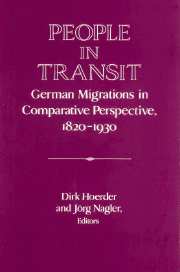Book contents
- Frontmatter
- Introduction
- PART I CONTINUITY AND COMPLEXITY: MIGRATIONS FROM EAST ELBIAN GERMANY AND GALICIAN POLAND
- Part II Internal German Migrations and In-Migrations
- 6 Traveling Workers and the German Labor Movement
- 7 Migration in Duisburg, 1821-1914
- 8 In-Migration and Out-Migration in an Area of Heavy Industry: The Case of Georgsmarienhütte, 1856-1870
- 9 Foreign Workers in and around Bremen, 1884-1918
- PART III WOMEN'S MIGRATION: LABOR AND MARRIAGE MARKETS
- PART IV ACCULTURATION IN AND RETURN FROM THE UNITED STATES
- 18 Migration Past and Present - The German Experience
- 19 Research on the German Migrations, 1820s to 1930s: A Report on the State of German Scholarship
- Index
9 - Foreign Workers in and around Bremen, 1884-1918
Published online by Cambridge University Press: 05 January 2013
- Frontmatter
- Introduction
- PART I CONTINUITY AND COMPLEXITY: MIGRATIONS FROM EAST ELBIAN GERMANY AND GALICIAN POLAND
- Part II Internal German Migrations and In-Migrations
- 6 Traveling Workers and the German Labor Movement
- 7 Migration in Duisburg, 1821-1914
- 8 In-Migration and Out-Migration in an Area of Heavy Industry: The Case of Georgsmarienhütte, 1856-1870
- 9 Foreign Workers in and around Bremen, 1884-1918
- PART III WOMEN'S MIGRATION: LABOR AND MARRIAGE MARKETS
- PART IV ACCULTURATION IN AND RETURN FROM THE UNITED STATES
- 18 Migration Past and Present - The German Experience
- 19 Research on the German Migrations, 1820s to 1930s: A Report on the State of German Scholarship
- Index
Summary
Due to its role as an emigration port, the city of Bremen figures prominently in the historical literature on migration. For millions of European emigrants, Bremen and Bremerhaven were the last places they experienced the Old World on their way overseas. But as the home port of the Norddeutsche Lloyd, Bremen was not only a place to pass through for overseas emigrants but also the destination of a great number of alien immigrants.
At the turn of the century the proportion of foreign-language speaking inhabitants in some communities on the outskirts of Bremen was about one-third. In the community of Delmenhorst, thousands of Bohemians, Poles, Ruthenians, and Croats lived amid the local German population. In 1901 nearly 60 percent of the 840 pupils who attended Blumenthal's Catholic church spoke Polish. Citizens of Bremen considered the so-called jutequarter to be an enclave of Poles and Czechs until the mid-1930s. In 1913 some 22,000 foreign immigrants were living in Bremen or in the surrounding communities, constituting approximately 7 to 8 percent of the local population. Today, they would be considered Gastarbeiter or “guest workers” on account of their status and living conditions.
The migration to Bremen, especially of immigrants from eastern Europe, never reached the scale of the Polish migration to the Ruhrgebiet. As a result, this migration's ethnic composition as well as the political and legal conditions to which it was subject were more diverse. The so-called Ruhr Poles (Ruhrpolen) came almost exclusively from Prussia's eastern provinces. Except for the Masurians, they were Catholic and all were German nationals. Moreover, Prussian anti-Polish regulations absolutely forbade the employment of foreign Poles coming from Russia and Austria-Hungary in industry. Along the Lower Weser, the Unterwesergebiet, the characteristics, structures, and interests of three jurisdictions came together- the Free Hanseatic City of Bremen, the Grand Duchy of Oldenburg, and the Prussian province of Hanover. As a result, different legal regulations concerning foreigners existed side by side with the German Reich's general Polish policy. Above all else, the multicultural character of the Unterwesergebiet makes a historical investigation of immigration into this region before World War I worth while.
- Type
- Chapter
- Information
- People in TransitGerman Migrations in Comparative Perspective, 1820–1930, pp. 201 - 224Publisher: Cambridge University PressPrint publication year: 1995
- 3
- Cited by



